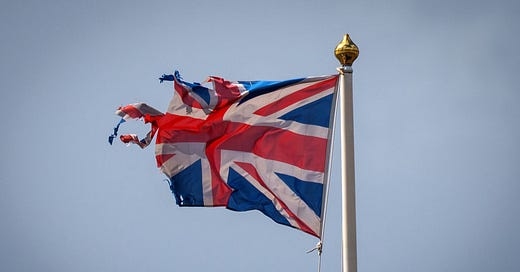
“But you can give it up, stop Shirriffing, if it has stopped being a respectable job,” said Sam.
“We’re not allowed to,” said Robin.
“If I hear not allowed much oftener,” said Sam, “I’m going to get angry.”
“Can’t say as I’d be sorry to see it,” said Robin, lowering his voice. “If we all got angry together something might be done.”
. . . This was Frodo and Sam’s own country, and they found out now that they cared about it more than any other place in the world. Many of the houses that they had known were missing. Some seemed to have been burned down. The pleasant row of old hobbit-holes in the bank on the north side of the Pool were deserted, and their little gardens that used to run down bright to the water’s edge were rank with weeds. Worse, there was a whole line of the ugly new houses all along Pool Side, where the Hobbiton Road ran close to the bank. An avenue of trees had stood there. They were all gone. And looking with dismay up the road towards Bag End they saw a tall chimney of brick in the distance. It was pouring out black smoke into the evening air.
. . . “This is worse than Mordor!” said Sam. “Much worse in a way. It comes home to you, as they say; because it is home, and you remember it before it was all ruined.”
—J.R.R. Tolkien, The Lord of the Rings, Book VI, ch. 8.
Something is rotten in the state of Britain. It was epitomized by a recent event at the Oxford Union, the 201-year-old debating society that is such a distinctive and admirable part of Oxford life. It was at the Union that, 40 years ago, I spoke as freely (and indeed as irresponsibly) as I ever have, discovering in the process that I was not cut out for politics. It was there that I saw great debaters of the past, present, and future.
But I never saw anything like the events of November 28.
The motion for debate was in itself a provocation: “This House Believes Israel Is an Apartheid State Responsible for Genocide.” But what was truly shocking was the conduct of the president of the Union, an Egyptian student named Ebrahim Osman-Mowafy, who appears to have abused his position by openly siding with those proposing the motion and treating the opposing speakers with contempt.
According to the broadcaster, Jonathan Sacerdoti, who was arguing for Israel’s side, Osman-Mowafy canceled the traditional pre-debate group photographs, but posed alone for private photos with the anti-Israel team. During the debate, the pro-Israel speakers were repeatedly heckled by the crowd. At one point, a young woman stood up and screamed at Sacerdoti: “Liar! Fuck you, the genocidal motherfucker!”
Mosab Hassan Yousef, the son of a senior Hamas leader who defected to Israel, who was arguing alongside Sacerdoti, was met with jeering derision and cries of “traitor” and “prostitute” (in Arabic). Yousef asked the audience to indicate by a show of hands how many of them would have reported prior knowledge of the October 7, 2023, atrocities to Israel. Not even a quarter of the crowd raised their hands.
For the other side, Miko Peled, an Israeli general’s son turned radical anti-Zionist, described the murders, rapes, and kidnappings of October 7 as “acts of heroism.” The Palestinian poet Mohammed El-Kurd, who has equated Zionism with genocide, began his speech by announcing that there was “no room for debate” and ended it by walking out of the chamber. The motion passed by 278 in favor to 59 against.
Reading reports of this shameful fiasco at my alma mater, I found myself wondering: Where are the Thought Police when you really need them? After all, the Oxford Union’s latest debate sounded a lot like one of those “noncrime hate incidents” that currently consume so much of the British police’s time.




